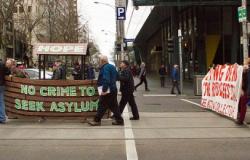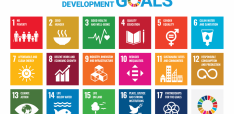Welcoming Refugees despite the State

In this interview, Bue Rübner Hansen and Cameron Thibos explore how cities and activists across Europe are fighting their national governments to better welcome refugees.
Cameron Thibos: Could you please tell us a bit about yourself and your research?
My name is Bue Rübner Hansen. I originally come from Denmark and have a research project there at the University of Aarhus. I am mainly based in Barcelona at the moment. I’m researching the emergence of new ideas of the good life in common, in Spanish social movements, but also the new municipalist experiments here in Spain. One idea that is very relevant to the conference we are having here is the idea of a refugee city. This is an idea of the good life in common that will include in some ways that still remain to be seen, people with a refugee background.
Cameron: What is going on with these refugee movements in Barcelona today?
Bue: In September 2015, there was a considerable influx of refugees and also migrants – a floating distinction by the way which is often quite arbitrary. Ada Colau, the mayor of Barcelona, who has a social movements background in the housing rights movement, took the initiative to issue a letter signed by mayors of other European cities including large cities such as Paris. This said that the cities of Europe should take responsibility for welcoming refugees, especially given a situation in which states were very reluctant to live up to their responsibility for guaranteeing the human rights and the security of people escaping primarily from war, but also from the effects of climate change and other forms of oppression. So, Ada Colau’s idea of refugee cities was met with a lot of enthusiasm, across Europe and locally. It was a new and surprising move.
Many wrote to the municipality saying, “what can we do to help? We are ready to host people and help out in other ways”. A grassroots part of the citizen’s platform called Barcelona en Comu – Ada Colau’s platform – leapt into action to create different neighbourhood groups preparing for the arrival of refugees in Barcelona. Unfortunately, as in so many other European countries, the Spanish state proved completely unwilling to live up to its own commitments, such as to the European relocation scheme, so very few refugees have come to Spain. The promise was to take 18,000, but last time I checked it was less than 100.
Obviously, this was a joke. The way I have been involved in this, apart that is from my function as a researcher, is to write an independent report with three others for the municipality, looking into the legal and practical strategies that the municipality could use in order to put pressure on the Spanish state to allow refugees to come here. That has involved trips with the group to Lesbos and Athens as well as to Melilla – the Spanish enclave in Morocco – to investigate the possibilities of trans-municipal collaboration with mayors from elsewhere.
This resulted in the municipality striking a deal this spring with the mayor of Athens to bring 100 refugees from Athens to Barcelona, which involved a commitment to resources for reception – access to health, housing etc. This was then brought to the Spanish state to say, ‘look, we have the papers and the resources ready. You just need to sign this to activate it under the European relocation scheme’. Mariano Rajoy, the Spanish president, refused. He had said that he wasn’t taking people until they were ready and had the resources, but now he refused point blank to sign. So these obviously were just excuses, and very bad ones at that. They indicate a clear lack of political will on the part of the Spanish central government to take any responsibility for their part in solving this issue.
Barcelona has received so far a very small number of refugees, so that the grassroots readiness to receive people has been frustrated in different ways. It raises the question of how one can help the solidarity initiatives that are going on in Greece from here, and how can we learn from those? We need to create a trans-local support system. This is part of my every day activity.
Then, my research is also closely connected to this. It asks, what is the power of cities? – not just to welcome people, but also to create solidarity. I insist on making a distinction between these two. Welcoming easily becomes a kind of charitable act, where either civil society takes on the responsibility for doing it, or people don’t do anything and they expect the state to take care of it all – which is more the traditional model.
In either case a clientelistic relationship is easily set up, which comes from charitable work. People are helped, but they do not become a part of the networks and the structures of social solidarity of the societies that they arrive into. They might get access to certain (but rarely enough) resources, but they don’t become part of the networks that produce, that make claims on rights and that can therefore produce rights, and that can also force governments to respect the rights that they already have. In all societies there exist forms of social solidarity that enable people to do this – the most historically important is the trade union, but you have social movements, neighbourhood groups, cooperatives, many different types of institutions that can play that sort of role.
Cameron: So how do we move from having refugees as beneficiaries of charity to refugees as productive contributors when the national state opposes that project? How is that opposition overcome or circumvented by local actors?
Bue: First I would say a little about cities. Across Europe you see governments that are very reluctant to deal with this problem. The ‘refugee crisis’ is a crisis of reception, of hospitality let’s say, a crisis in the expectations we have of our governments to provide for people who are in dire need, and to guarantee their human rights.
The vast majority of governments in Europe are not living up to these responsibilities. In that situation, it is noticeable that many cities – and not just those who have the responsibility to deal with people when they arrive – are more willing to receive people in a decent way than their national governments.
One reason for this is that most European cities today are profoundly multicultural. They are the sites of grassroots cosmopolitanism in a sense, which finds itself in opposition to the abstract cosmopolitanism of the European elites, for instance. It is people working together and sharing the same neighbourhoods. People who have an immediate interest in creating a situation of conviviality in their cities.
Cities are also the places where typically you have the strongest social movements, and the strongest awareness of the ways that xenophobia and racism harm not just the people under attack, but harm the citizens’ capacity to live together in a positive way. There are many cities where you can see this clearly in the radicalisation of far-right activists on the one side, and Salafist extremists – another right-wing ideology – mutually feeding off each other. So it is in the interest of every one of us, except those on the extremes, to make things work. There’s greater awareness of this in the cities.
hat greater awareness will not necessarily be located at city governance level. Barcelona is a city where it is very strong. But there are many other places where this is not the case. However, municipal institutions, interestingly enough, are often more amenable to pressure from citizens. It is easier to win a municipal election than a national election. It is easier to address your local council than to change the minds of political parliamentarian elites, who are often far-removed from the concerns of their constituents.
All of Europe is suffering from a crisis in democracy, and now I am talking about a far more profound crisis that has to do with much more than migration. This crisis is connected to the economy of scarcity that came with the financial crisis, however it was already present before that in cuts to welfare services, precarious employment, and so on. By a crisis of democracy, I mean a situation in which representation breaks down and political elites are either unwilling or unable to address people’s concerns. Starting from the cities, as we have seen in Spain, it is possible to start to produce a change. Of course it does not end with the cities, but there at least it is possible to have this direct relational production of solidarity.
To put this into context in Barcelona – last year, in the Spanish municipal elections in May, municipal grassroots platforms won the elections in Barcelona, Madrid, Saragossa, Valencia, Santiago, A Coruña, and Cadiz, and among those you have four of the five biggest cities in Spain. This shows something about the potential for municipalism, at least in this country.
People here in the municipal government see a responsibility on their part, being in the position that they are, to try to create new forms of reception and integration. Unfortunately they have been frustrated by the fact that so few refugees and migrants have arrived. But the vision remains to work on this issue and to share experiences with other municipalities, as well as to create a network of refugee cities, through which you can put pressure on the European Union and on national governments as well.
Cameron: I was wondering if you could comment a bit on the rise of parallel, opposing movements that we’ve seen of late in lots of places. Could you speak a bit about the base source of these diverging movements, if there is one, and the different paths they’re following to achieve what they think of as the good life in common?
Bue: To understand the growth of both left-wing movements and right-wing movements in Europe since the financial crisis, you have to understand the crisis itself. You have to understand the production of insecurity that took place beforehand, of people becoming casualised in their employment and having their work outsourced. There was a growth of insecurity, which was only accelerated by many governments’ imposition of austerity, cuts to public services, etc.
Before this, there was a situation of apparent growth. If you experienced any problems in your life, you might feel resentful, but you tended to blame yourself because it was not apparent that it was a broad social phenomenon. But with the financial crisis it became clear to many people that they were not to blame for their failures in life. That there were structural economic changes going on, and those were coming from some other source.
You could blame the banks – a very valid position of course! The governments that created housing bubbles could also be blamed for facilitating what happened with the banks. But some people also preferred to listen to far right parties who were blaming migrants.
It is clear that in this sort of situation there is no way to avoid conflict. When so many people are being left outside what they consider to be a dignified life, through no fault of their own, someone or something is to blame! You have to pinpoint structural causes and the people who you think possibly stand in the way of solutions.
You see in the north of Europe, where the social democratic parties have committed themselves completely to austerity yet where there haven’t been any strong social movements against this, that there has been a strong growth in the far right. The Netherlands, Denmark, Britain, Norway, Sweden, Austria, Germany, all relatively wealthy countries in which the right has been successful in defining the problem as one of migration – a demonstrably false claim, of course.
In the south of Europe there are different scenarios. In Spain, interestingly, there hasn’t been the growth of the populist far right. This has to do with the 15M movement (outside of Spain usually referred to as the Indignados, which occupied the squares in 2011). Hundreds of thousands of people, I think in all it was 1.3 million people, participated in the different squares movements.
They came together and shared different narratives on social media as well as in person. These narratives defied what the media was telling them, and made it quite clear who was to blame – they were looking at the structural forces, the bank crisis, the housing bubble and those corrupt politicians often in cahoots with the banks, who had facilitated this economic crash. Those occupations sucked the space away from the far right for articulating social discontent. So, this shows us a little bit about how a society decides which way to go in handling a broader problem, one which has nothing to do with migrants and refugees, but which is a situation of imposed scarcity – scarcity imposed from above, and of insecurity.
You can also talk about two different versions of solidarity that fit with this. One is ‘solidarity for all, to take the name of a very important Greek initiative. The other is ‘solidarity for all Greeks, or all Germans, or all Brits … all whatever’. So you have an exclusive, national sovereignty on the one hand, and an open solidarity that covers everyone in need on the other.
To come back to the cities. The closed solidarity, the solidarity of each nationality or each ethnicity to its own, is a form of solidarity which can only create divisions in cities that are a mix of many different populations. If these solidarities create competition between different groups, then they will create conflict, and that makes conviviality in the city difficult. Whereas forms of solidarity that are open to everyone inhabiting the city and that respect everyone’s right to be there – everyone’s right to the city – those are the solidarities that undermine these divisions, undermine racism and xenophobia, undermine Islamist and Salafist extremism etc.
So, of course as a researcher this is all very interesting! But as someone who inhabits this world and who cares about this world, it motivates me a lot to produce knowhow and share practises and so on that push in one direction rather than the other.
Cameron: Has Barcelona seen a pushback from certain segments of the population? Not everybody can agree with Ada Colau’s programme.
Bue: Of course. In Barcelona, there are two groups who are dissatisfied with Ada Colau. First, there are those who stand to lose. The banks, for instance, stand to lose because Ada Colau is fining them for having empty buildings in a city where rents are going up and where you have homelessness. Of course the hotel lobby is protesting against Ada Colau because she is trying to make the city less for tourists than it is now, and more oriented to the locals of Barcelona. Those who stand to lose from an expanded sense of solidarity with the poorest, the most precarious inhabitants, are one group against her.
The other group who attacks Ada Colau are those who feel that they are not winning enough: those who want more. Those who say, ‘refugee city is all fine, but what about the long-term migrants who are already here? What about the West African street sellers who have been here such a long time!” They are being harassed by the police and criminalised in different ways.
Given the legal competences of the municipal government, it is a hard issue for the city government to solve. People are pushing Ada Colau, sometimes attacking her and the government fiercely, for not having resolved the issue. So those are the two camps: those who stand to win from her going more strongly in the direction of expanding solidarity in its broad sense, and those who stand to lose.
Cameron Thibos is the managing editor of Beyond Trafficking and Slavery and Mediterranean Journeys in Hope. He is a former research associate at the Migration Policy Centre of the European University Institute in Florence, Italy, and possesses regional expertise in Turkey and the Arab World. Cameron received his D.Phil (PhD) in 2014 from the Department of International Development at the University of Oxford. Bue Rübner Hansen, @BueRubner, is a postdoctoral fellow at the University of Aarhus, researching the emergence of ideas of the good life in common, as well as questions of class composition, migration and economic crisis. He is an editor of Viewpoint Magazine, and a participant in the refugee city group of Barcelona en Comú. This post is part of OpenDemocracy's 'Mediterranean journeys in hope' series.
Photo credit: Tali C. via Foter.com / CC BY-NC-SA

